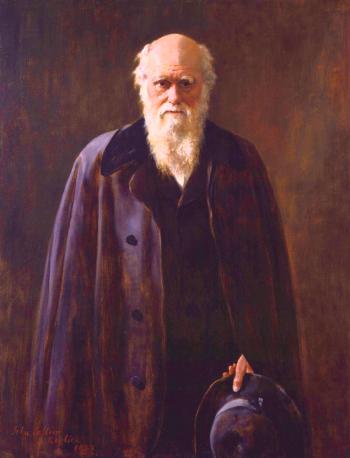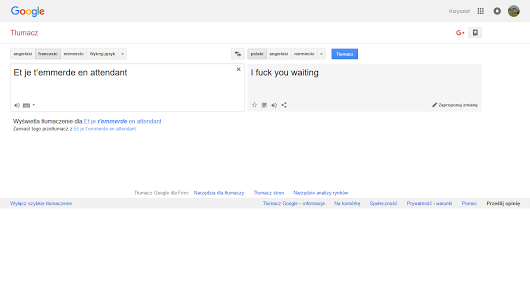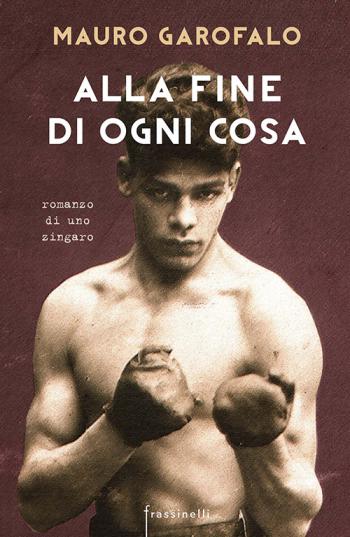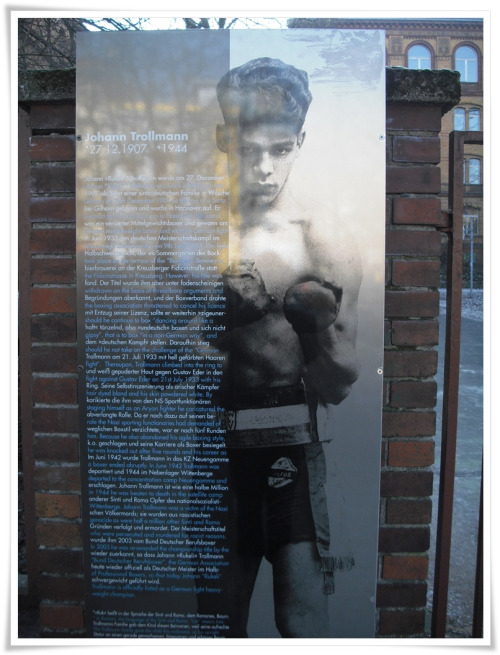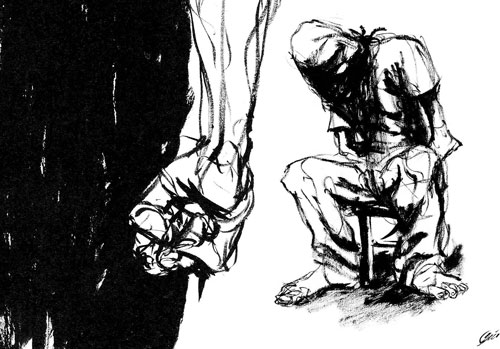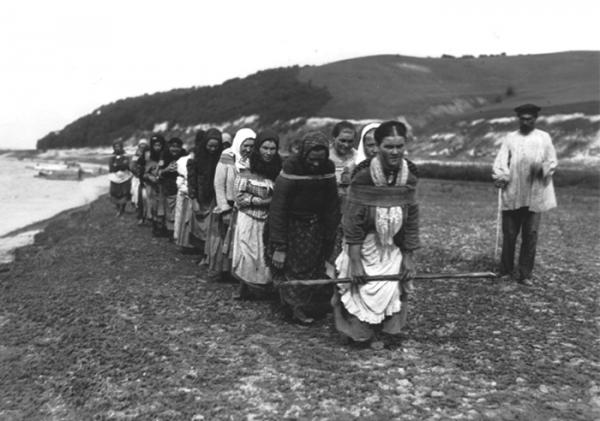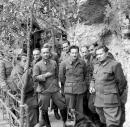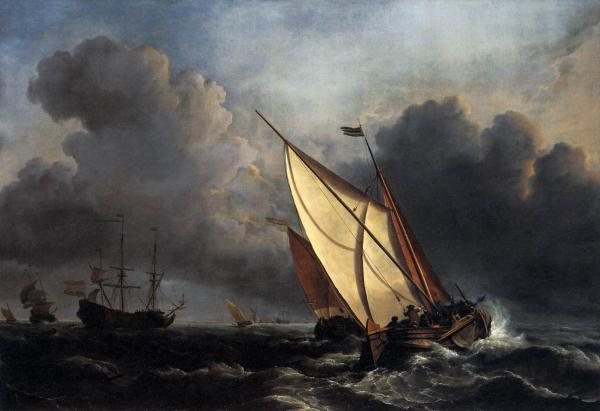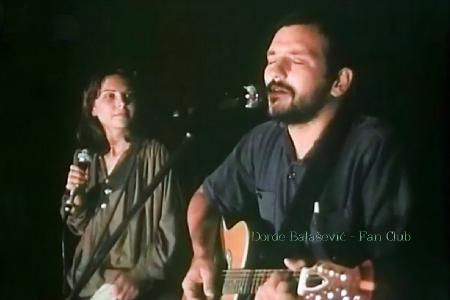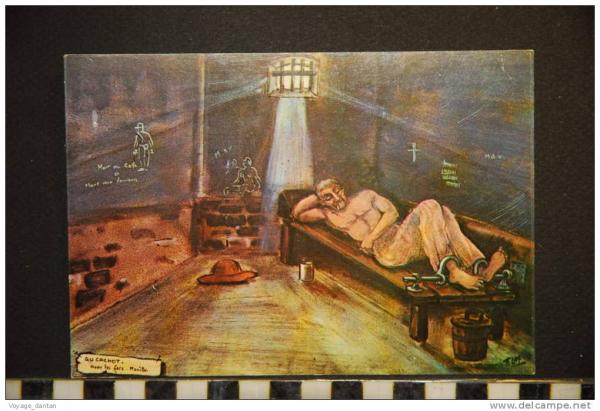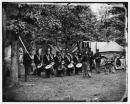Ballata degli impiccati
La versione inglese di Dennis Criteser [2014]

Dal blog Fabrizio De André in English
"La ballata degli impiccati" is closely related to a 1462 poem, "Ballade des pendus" by François Villon, written in prison while waiting for his execution. Whereas Villon asks for pity for the condemned, the lyrics of De Andrè and Bentivoglio express rancor for those who judged, for those who buried, even for those who remembered, all of whom will inevitably also meet their ends.
Tutti morimmo a stento, released in 1968, was one of the first concept albums in Italy. In De Andrè's own words, the album "speaks of death, not of bubble gum death with little bones, but of psychological death, moral death, mental death, that a normal person can encounter during his lifetime." After the success of Volume I, De André was provided for this next album a cutting edge recording studio complete with an 80-member orchestra, directed by Gian Piero Reverberi, and a... (continuer)
"La ballata degli impiccati" is closely related to a 1462 poem, "Ballade des pendus" by François Villon, written in prison while waiting for his execution. Whereas Villon asks for pity for the condemned, the lyrics of De Andrè and Bentivoglio express rancor for those who judged, for those who buried, even for those who remembered, all of whom will inevitably also meet their ends.
Tutti morimmo a stento, released in 1968, was one of the first concept albums in Italy. In De Andrè's own words, the album "speaks of death, not of bubble gum death with little bones, but of psychological death, moral death, mental death, that a normal person can encounter during his lifetime." After the success of Volume I, De André was provided for this next album a cutting edge recording studio complete with an 80-member orchestra, directed by Gian Piero Reverberi, and a... (continuer)
BALLAD OF THE HANGED MEN
(continuer)
(continuer)
envoyé par Riccardo Venturi 9/2/2016 - 21:49
Fabrizio De André: Amico fragile
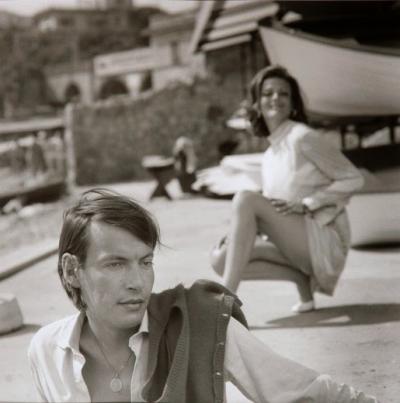
Dal blog Fabrizio De André in English
"De André wrote "Amico fragile" in a drunken rage after attending a party of rich Italians vacationing on Sardinia. They were only interested in having him play guitar and sing his songs, whereas De André wanted to engage people in discussions about events going on in Italy. He became ever more frustrated and inebriated with the shallowness of the evening, returning home to stay up all night and produce this "stream of semi-consciousness" rant. The song was a staple in his live shows and was one of De André's favorites." - Dennis Criteser
"De André wrote "Amico fragile" in a drunken rage after attending a party of rich Italians vacationing on Sardinia. They were only interested in having him play guitar and sing his songs, whereas De André wanted to engage people in discussions about events going on in Italy. He became ever more frustrated and inebriated with the shallowness of the evening, returning home to stay up all night and produce this "stream of semi-consciousness" rant. The song was a staple in his live shows and was one of De André's favorites." - Dennis Criteser
FRAGILE FRIEND
(continuer)
(continuer)
envoyé par Riccardo Venturi 9/2/2016 - 20:47
Andrea
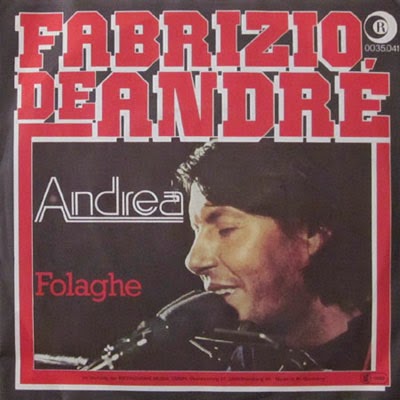
Dal blog Fabrizio De André in English
"Andrea" is both an anti-war song and a statement of solidarity with and acceptance of gays, as the song is about the love between two men (Andrea is a man's name in Italian). The setting for the song is World War I, which can be deduced because intense battles occurred on the ground in the mountains of Trent during WWI, whereas in WWII Trent suffered bombing from the air by the Germans toward the end of the war.
Rimini grew out of De André's disappointments with the political events of the previous couple of years. In close collaboration with Massimo Bubola, a young 24-year-old who had just released his first album, De André explored several social and political themes, including abortion, homosexuality, and how the petty bourgeois attempted to move into the ranks of the powerful and rise above the political and social turmoil of the times. The music... (continuer)
"Andrea" is both an anti-war song and a statement of solidarity with and acceptance of gays, as the song is about the love between two men (Andrea is a man's name in Italian). The setting for the song is World War I, which can be deduced because intense battles occurred on the ground in the mountains of Trent during WWI, whereas in WWII Trent suffered bombing from the air by the Germans toward the end of the war.
Rimini grew out of De André's disappointments with the political events of the previous couple of years. In close collaboration with Massimo Bubola, a young 24-year-old who had just released his first album, De André explored several social and political themes, including abortion, homosexuality, and how the petty bourgeois attempted to move into the ranks of the powerful and rise above the political and social turmoil of the times. The music... (continuer)
ANDREA
(continuer)
(continuer)
envoyé par Riccardo Venturi 9/2/2016 - 20:36
Canzone per l’estate
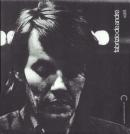
Dal blog Fabrizio De André in English
"The music of "Canzone per l'estate" is entirely De Gregori's, while the lyrics were co-written. De André described the song as somewhat autobiographical, describing the tension between the bourgeois life he grew up in and lived much of his life in, and his attraction to anarchism and to society's outcasts who seemed more genuine and alive than the upper classes. Indeed the song describes well the soul-sapping nature of a comfortable, prosperous life that takes one away from vitality and even political engagement ("your eyes closed to the people")." - Dennis Criteser
SONG FOR THE SUMMER
(continuer)
(continuer)
envoyé par Riccardo Venturi 9/2/2016 - 20:25
La cattiva strada

Dal blog Fabrizio De André in English
"Literally, "cattiva strada" means "bad road." But in a moral sense, if you're straying down the wrong path, going down a slippery slope or leading someone astray, you're on a "cattiva strada" and more than a paving crew will be needed. Author and De André expert Cesare Romana observed the following about "La cattiva strada": "The song is among the most illustrative of the philosophy of a great moralist disguised as an 'immoralist.' The bad road represents a pirate ethic, and also the free port where the powers-that-be don't come. Thus it comes to be defined as bad, yet holding these mainstream powers at a distance endows a force most subversive and revolutionary that can be placed at our disposition: love. The fact is that De André never moved far from the bad road. He continued to think that the humanity, love and dignity of man resided there, and... (continuer)
"Literally, "cattiva strada" means "bad road." But in a moral sense, if you're straying down the wrong path, going down a slippery slope or leading someone astray, you're on a "cattiva strada" and more than a paving crew will be needed. Author and De André expert Cesare Romana observed the following about "La cattiva strada": "The song is among the most illustrative of the philosophy of a great moralist disguised as an 'immoralist.' The bad road represents a pirate ethic, and also the free port where the powers-that-be don't come. Thus it comes to be defined as bad, yet holding these mainstream powers at a distance endows a force most subversive and revolutionary that can be placed at our disposition: love. The fact is that De André never moved far from the bad road. He continued to think that the humanity, love and dignity of man resided there, and... (continuer)
THE ERRANT WAY
(continuer)
(continuer)
envoyé par Riccardo Venturi 9/2/2016 - 18:41
Capitalistic Boss
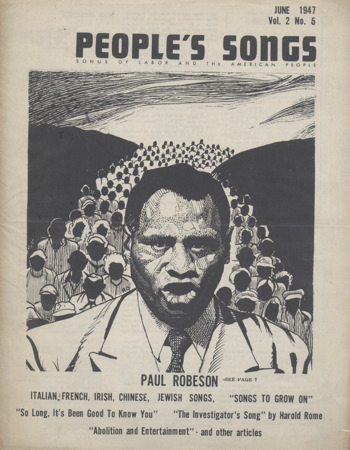
[1937 o 1941]
Parole di Saul Aarons
Musica di Mike Stratton
Testo trovato su Labor Arts
Canzone inclusa nella raccolta “Songs For Political Action - Folk Music And The American Left 1926 – 1953” (1996)
Originariamente pubblicato sul Volume III (nn. 6 e 7, luglio/agosto 1948) del “People's Song Bulletin”
Non ci sono molto notizie in Rete sull’autore di questa allegra e sarcastica canzoncina, dotata di un umorismo marcatamente “yiddish”… Mettendo insieme alcuni frammenti, Saul Aarons deve essere stato, seppur marginalmente, un songwriter che a New York fece parte dell’organizzazione “People’s Songs”, lì fondata nel 1945 da Pete Seeger, Alan Lomax e Lee Hays, nata per promuovere le canzoni provenienti dal movimento operaio americano.
Sono un boss capitalista… non sono cattivo, è che mi dipingono così… E’ vero, a volte mi comporto male ma non so spiegarmi il perché, c’è qualcosa che non va nel mio cervello… Sono malato di “capitalistite”!...
Parole di Saul Aarons
Musica di Mike Stratton
Testo trovato su Labor Arts
Canzone inclusa nella raccolta “Songs For Political Action - Folk Music And The American Left 1926 – 1953” (1996)
Originariamente pubblicato sul Volume III (nn. 6 e 7, luglio/agosto 1948) del “People's Song Bulletin”
Non ci sono molto notizie in Rete sull’autore di questa allegra e sarcastica canzoncina, dotata di un umorismo marcatamente “yiddish”… Mettendo insieme alcuni frammenti, Saul Aarons deve essere stato, seppur marginalmente, un songwriter che a New York fece parte dell’organizzazione “People’s Songs”, lì fondata nel 1945 da Pete Seeger, Alan Lomax e Lee Hays, nata per promuovere le canzoni provenienti dal movimento operaio americano.
Sono un boss capitalista… non sono cattivo, è che mi dipingono così… E’ vero, a volte mi comporto male ma non so spiegarmi il perché, c’è qualcosa che non va nel mio cervello… Sono malato di “capitalistite”!...
I'm the much-maligned capitalistic boss
(continuer)
(continuer)
envoyé par Bernart Bartleby 9/2/2016 - 13:47
Spring Song
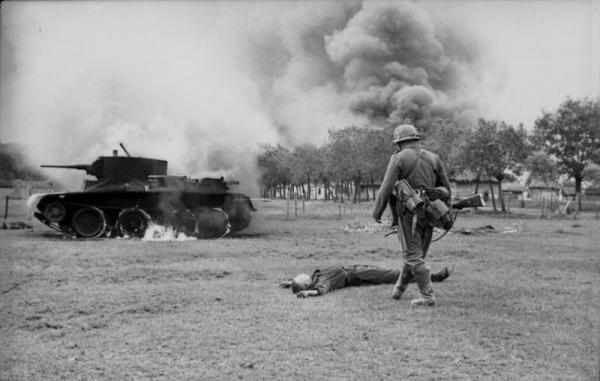
[1941]
Versi di Harry Schachter
Musica di Earl Robinson
Trovo il brano in un paio di compilation, quella proveniente dalla DDR intitolata “Das Andere Amerika” (1966) e la più recente “Songs For Political Action - Folk Music And The American Left 1926 – 1953” (sempre tedesca ma del 1996)
Sicuramente una delle canzoni contro la guerra e pacifiste più sfigate della Storia.
Paul Robeson la incise nel maggio del 1941… Il 22 giugno Hitler invase l’Unione Sovietica… Il 7 luglio un contingente americano sbarcava in Islanda a sostegno delle truppe britanniche, primo assaggio del coinvolgimento degli Stati Uniti nel conflitto, formalizzato poi a dicembre dopo l’attacco giapponese a Pearl Harbor…
La “Canzone della Primavera” la cantarono veramente in pochi e per poco…
Versi di Harry Schachter
Musica di Earl Robinson
Trovo il brano in un paio di compilation, quella proveniente dalla DDR intitolata “Das Andere Amerika” (1966) e la più recente “Songs For Political Action - Folk Music And The American Left 1926 – 1953” (sempre tedesca ma del 1996)
Sicuramente una delle canzoni contro la guerra e pacifiste più sfigate della Storia.
Paul Robeson la incise nel maggio del 1941… Il 22 giugno Hitler invase l’Unione Sovietica… Il 7 luglio un contingente americano sbarcava in Islanda a sostegno delle truppe britanniche, primo assaggio del coinvolgimento degli Stati Uniti nel conflitto, formalizzato poi a dicembre dopo l’attacco giapponese a Pearl Harbor…
La “Canzone della Primavera” la cantarono veramente in pochi e per poco…
Oh, I wonder will we be at war this spring.
(continuer)
(continuer)
envoyé par Bernart Bartleby 9/2/2016 - 11:37
The Strange Funeral in Braddock
[1925]
Versi di Itzok Isaac Granich, in arte Michael "Mike" Gold (1894-1967), ebreo americano di origine rumena, scrittore, critico letterario, militante comunista
Musica di Elie Siegmeister (1909-1991), compositore ed autore
Nel 1936 il brano fu inciso da Mordecai Baumann (1912-2007), baritono newyorkese
Testo trovato qui
A Braddock, periferia di Pittsburgh, Pennsylvania, nel 1873 fu impiantato l’“Edgar Thomson Steel Works”, uno dei primi stabilimenti per la produzione dell’acciaio ad usare altiforni per il cosiddetto processo Bessemer, innovativi per l’epoca. La fabbrica richiamò un gran numero di immigrati, soprattutto da Croazia, Slovenia e Ungheria. La fortuna di Braddock, fondata sulla “monocoltura” dell’acciaio, ebbe tragicamente termine tra gli anni 70 e gli 80 del secolo scorso. La crisi produttiva ed occupazionale, unitamente alla diffusione massiccia di crack e cocaina, distrussero... (continuer)
Versi di Itzok Isaac Granich, in arte Michael "Mike" Gold (1894-1967), ebreo americano di origine rumena, scrittore, critico letterario, militante comunista
Musica di Elie Siegmeister (1909-1991), compositore ed autore
Nel 1936 il brano fu inciso da Mordecai Baumann (1912-2007), baritono newyorkese
Testo trovato qui
A Braddock, periferia di Pittsburgh, Pennsylvania, nel 1873 fu impiantato l’“Edgar Thomson Steel Works”, uno dei primi stabilimenti per la produzione dell’acciaio ad usare altiforni per il cosiddetto processo Bessemer, innovativi per l’epoca. La fabbrica richiamò un gran numero di immigrati, soprattutto da Croazia, Slovenia e Ungheria. La fortuna di Braddock, fondata sulla “monocoltura” dell’acciaio, ebbe tragicamente termine tra gli anni 70 e gli 80 del secolo scorso. La crisi produttiva ed occupazionale, unitamente alla diffusione massiccia di crack e cocaina, distrussero... (continuer)
Listen to the drums of a strange American funeral.
(continuer)
(continuer)
envoyé par Bernart Bartleby 9/2/2016 - 10:24
Canzone per l’estate

In realtà, Fabrizio De André descrisse questa canzone (il cui testo è, sarà bene ricordarlo, stato scritto assieme a Francesco De Gregori) come in un certo qual modo autobiografica. Parla, secondo De André, della tensione tra la vita borghese in cui era cresciuto e aveva vissuto parte della sua vita, e l’attrazione per l’Anarchia e per gli “ultimi” della società, che gli sembravano molto più vivi e genuini delle classi superiori. Fatta salva l’oscurità del testo, caratteristica del resto saliente di quell’album “degregoriano”, si avverte comunque abbastanza bene l’attacco alla vita borghese, confortevole e prospera, che distoglie l’essere umano dalla vitalità e dall’impegno politico (gli “occhi chiusi sulla gente”). Per quel che mi riguarda, l’ho sempre avvertita molto come una canzone sulla dissoluzione della famiglia borghese.
Riccardo Venturi 9/2/2016 - 08:06
Il testamento di Tito

Dal blog Fabrizio De André in English
"Il testamento di Tito" takes us into the Old Testament to the Ten Commandments. Tito, the so-called good thief from the Syriac Infancy Gospel, recounts how he violated each of the commandments (except "Thou shalt not kill"), offering critiques along the way. De André considered this song one of his very best for its hard-hitting social impact." - Dennis Criteser
TITO'S WILL
(continuer)
(continuer)
envoyé par Riccardo Venturi 9/2/2016 - 07:42
Il Pescatore

Dal blog Fabrizio De André in English
"Il pescatore" was released in 1970 as a single. One of De André's most popular songs, it never appeared on a studio album, but can be heard on several live albums." - Dennis Criteser
THE FISHERMAN
(continuer)
(continuer)
envoyé par Riccardo Venturi 9/2/2016 - 07:27
La domenica delle salme
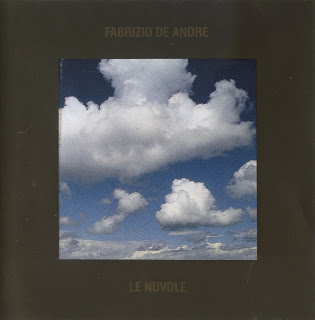
Dal blog Fabrizio De André in English
""La domenica delle salme" is one of De André's most political songs, full of references not easily discernible. The second verse refers to a Milan retirement home resident who was discovered dead under mysterious circumstances. The third verse may refer to a series of murders by a neo-Nazi duo who tagged themselves as Ludwig. The fourth verse refers to the Polish refugees who came to Italy after the fall of the Soviet Union and who worked the streets cleaning car windows (i.e., redoing the makeup of the capitalists heading off to the beach). The fifth verse refers to businessmen looking to profit from the opening of the countries of the former Soviet Union, and the sixth verse refers to the neo-Nazism that subsequently raised its head. The seventh verse may refer to the need for another visible symbol for members of the left and the right to use to... (continuer)
""La domenica delle salme" is one of De André's most political songs, full of references not easily discernible. The second verse refers to a Milan retirement home resident who was discovered dead under mysterious circumstances. The third verse may refer to a series of murders by a neo-Nazi duo who tagged themselves as Ludwig. The fourth verse refers to the Polish refugees who came to Italy after the fall of the Soviet Union and who worked the streets cleaning car windows (i.e., redoing the makeup of the capitalists heading off to the beach). The fifth verse refers to businessmen looking to profit from the opening of the countries of the former Soviet Union, and the sixth verse refers to the neo-Nazism that subsequently raised its head. The seventh verse may refer to the need for another visible symbol for members of the left and the right to use to... (continuer)
PSALM SUNDAY
(continuer)
(continuer)
envoyé par Riccardo Venturi 9/2/2016 - 07:07
Carlo Martello torna [o: ritorna] dalla battaglia di Poitiers; o Carlo Martello
![Carlo Martello torna <i>[o: ritorna]</i> dalla battaglia di Poitiers; <i>o</i> Carlo Martello](img/thumb/c1095_130x140.jpeg?1328357200)
Dal blog Fabrizio De André in English
"This song was released in 1963 as the B side of a 45 with "Il fannullone" as the A-side. The text was written by a friend from childhood, Paolo Villagio, and the music is by De Andrè. The Battle of Poitiers occurred in 732, a battle between the Franks and the Moors in what is now northern France. The song is in the style of popular French pastourelles sung by medieval troubadours about encounters between knights and country girls. In 1965 a complaint was brought against De Andrè and his label Karim for obscene content in the lyrics. The case was settled in De Andrè's favor in 1968. The Italian in this song is an old style, and Riccardo Venturi has done a nice translation into a similarly "olde" style of English." - Dennis Criteser
CHARLES MARTEL RETURNS FROM THE BATTLE OF POITIERS
(continuer)
(continuer)
envoyé par Riccardo Venturi 9/2/2016 - 06:56
Il fannullone
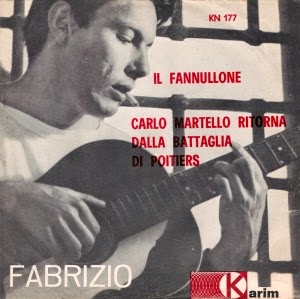
Dal blog Fabrizio De André in English
"Il fannul[l]one" was the A-side of De Andrè's third single on Karim, released in 1963. It was co-written with Paolo Villaggio, a childhood friend. There are several strains in this early song that will surface regularly in later songs: going against the grain of mainstream society, a sense of irony towards so-called respectable folk ("la gente per bene"), and an irreverent and playful attitude. The song no doubt sprang from the anti-conformist lifestyles of the two young authors. Riccardo Venturi called this song "deliciously revolutionary and subversive" and described it as a "hymn to doing nothing," where to do nothing is to live life truly, not allowing a dehumanized corporate complex to take it away from you." - Dennis Criteser
"Il fannul[l]one" was the A-side of De Andrè's third single on Karim, released in 1963. It was co-written with Paolo Villaggio, a childhood friend. There are several strains in this early song that will surface regularly in later songs: going against the grain of mainstream society, a sense of irony towards so-called respectable folk ("la gente per bene"), and an irreverent and playful attitude. The song no doubt sprang from the anti-conformist lifestyles of the two young authors. Riccardo Venturi called this song "deliciously revolutionary and subversive" and described it as a "hymn to doing nothing," where to do nothing is to live life truly, not allowing a dehumanized corporate complex to take it away from you." - Dennis Criteser
THE SLOUCH
(continuer)
(continuer)
envoyé par Riccardo Venturi 9/2/2016 - 06:20
Cotton Fields
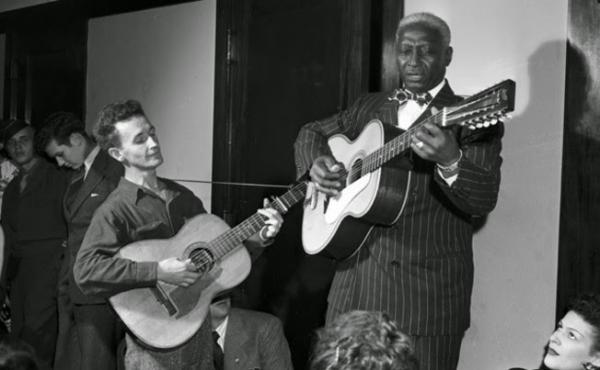
[1940]
Parole e musica di Huddie Ledbetter, detto Leadbelly, che incise questo brano autobiografico nel 1940. Però i primi ad includere la canzone in album e a renderla uno standard, non solo della musica nera (dato anche il suo ritmo originario, comunque “country”) furono Odetta (“The Tin Angel”, 1954, con Lawrence B. Mohr) ed Harry Belafonte (“Belafonte Sings the Blues”, 1958).
Poi le moltissime cover, fra cui spiccano quelle dei Beach Boys e dei Creedence Clearwater Revival, nonchè quelle dei soliti “saccheggiatori” Johnny Cash ed Elvis Presley.
Propongo questo brano perchè, al di là del suo ritmo scanzonato, racconta della durezza della vita dei neri nel profondo sud degli USA alla fine dell’800, quando Leadbelly era un bimbo. I campi di cotone a perdita d’occhio erano il solo paesaggio, che la raccolta andasse bene e il prezioso vegetale non marcisse a causa del parassita “boll weevil”... (continuer)
Parole e musica di Huddie Ledbetter, detto Leadbelly, che incise questo brano autobiografico nel 1940. Però i primi ad includere la canzone in album e a renderla uno standard, non solo della musica nera (dato anche il suo ritmo originario, comunque “country”) furono Odetta (“The Tin Angel”, 1954, con Lawrence B. Mohr) ed Harry Belafonte (“Belafonte Sings the Blues”, 1958).
Poi le moltissime cover, fra cui spiccano quelle dei Beach Boys e dei Creedence Clearwater Revival, nonchè quelle dei soliti “saccheggiatori” Johnny Cash ed Elvis Presley.
Propongo questo brano perchè, al di là del suo ritmo scanzonato, racconta della durezza della vita dei neri nel profondo sud degli USA alla fine dell’800, quando Leadbelly era un bimbo. I campi di cotone a perdita d’occhio erano il solo paesaggio, che la raccolta andasse bene e il prezioso vegetale non marcisse a causa del parassita “boll weevil”... (continuer)
When I was a little baby
(continuer)
(continuer)
envoyé par Bernart Bartleby 8/2/2016 - 22:03
Cent'anni
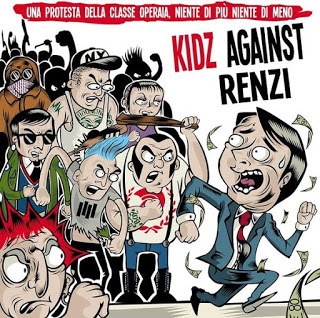
2016
Kidz against Renzi
Kidz against Renzi
Mi sono informato , c'e' un treno
(continuer)
(continuer)
envoyé par dq82 8/2/2016 - 15:43
Told My Cap'n
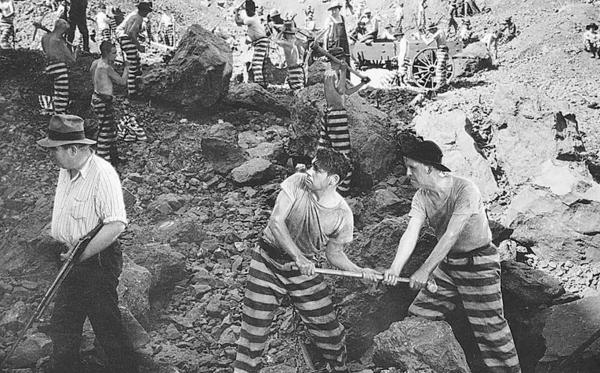
[1940]
Nel disco intitolato “Chain Gang”, con il gruppo dei Carolinians
"Columbia Records proudly presents what is perhaps the most genuine folk music of our times... Seven Negro laments of the chain gang sung by Joshua White and his Carolinians" (from liner notes)
Ancora una canzone sulle chain gang, le squadre di prigionieri alla catena, o work gang, sempre composte in gran parte da neri, data la loro altissima percentuale fra la popolazione carceraria.
Anche qui il captain (in altre canzoni è il walker) esercita il totale arbitrio e la più spietata violenza sui prigionieri, arrivando ad ucciderne uno a sangue freddo… Ma – come in Nine Foot Shovel – il carnefice ha le ore contate…
Senz’altro il testo non è farina del sacco di White ma deriva da canti dei detenuti nelle prison farms del Sud negli anni 20, come la Grade Song che trovo su Mudcat Café…
Nel disco intitolato “Chain Gang”, con il gruppo dei Carolinians
"Columbia Records proudly presents what is perhaps the most genuine folk music of our times... Seven Negro laments of the chain gang sung by Joshua White and his Carolinians" (from liner notes)
Ancora una canzone sulle chain gang, le squadre di prigionieri alla catena, o work gang, sempre composte in gran parte da neri, data la loro altissima percentuale fra la popolazione carceraria.
Anche qui il captain (in altre canzoni è il walker) esercita il totale arbitrio e la più spietata violenza sui prigionieri, arrivando ad ucciderne uno a sangue freddo… Ma – come in Nine Foot Shovel – il carnefice ha le ore contate…
Senz’altro il testo non è farina del sacco di White ma deriva da canti dei detenuti nelle prison farms del Sud negli anni 20, come la Grade Song che trovo su Mudcat Café…
Told my cap'n
(continuer)
(continuer)
envoyé par Bernart Bartleby 8/2/2016 - 15:22
Il chimerico Morfeo
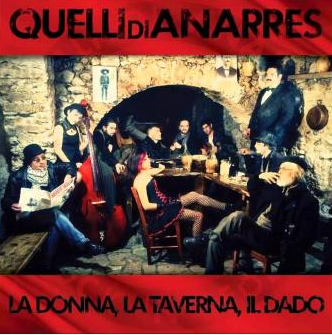
2015
La donna, la taverna, il dado
La donna, la taverna, il dado
Ho visto grandi delle multinazionali donare terre, costruzioni e anche denari
(continuer)
(continuer)
envoyé par dq82 8/2/2016 - 15:18
Parcours:
Déserteurs
Auf den Tod eines Fußballspielers
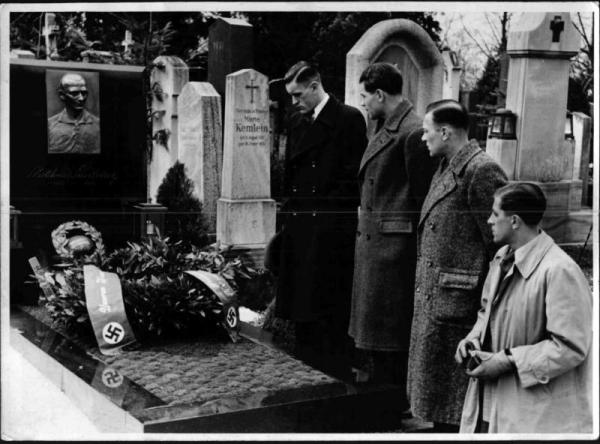
[1945]
Versi di Friedrich Torberg, pseudonimo di Friedrich Ephraim Kantor-Berg (1908-1979), scrittore, giornalista ebreo austriaco, di origine ceca.
Musicata da Christoph Holzhöfer
Approfondendo la vicenda di Johann Trollmann Rukelie, il grande pugile zingaro tedesco che si battè fino alla fine contro i nazisti, ho scoperto un’altra storia di un campione dello sport che non piegò la testa e che sfidò apertamente Hitler.
Questa poesia di Friedrich Torberg – che negli anni 40 finì esule negli USA dopo aver lungo vagato per l’Europa, braccato dai nazisti – è dedicata a Matthias Sindelar (1903-1939), il più forte calciatore austriaco di sempre, centrocampista ed attaccante del “Wunderteam”, la meravigliosa nazionale austriaca degli anni 30. Soprannominato “Der Papierene”, ossia “carta velina”, per via della sua figura sottile, o anche il “Mozart del pallone”, per l’eleganza del movimento... (continuer)
Versi di Friedrich Torberg, pseudonimo di Friedrich Ephraim Kantor-Berg (1908-1979), scrittore, giornalista ebreo austriaco, di origine ceca.
Musicata da Christoph Holzhöfer
Approfondendo la vicenda di Johann Trollmann Rukelie, il grande pugile zingaro tedesco che si battè fino alla fine contro i nazisti, ho scoperto un’altra storia di un campione dello sport che non piegò la testa e che sfidò apertamente Hitler.
Questa poesia di Friedrich Torberg – che negli anni 40 finì esule negli USA dopo aver lungo vagato per l’Europa, braccato dai nazisti – è dedicata a Matthias Sindelar (1903-1939), il più forte calciatore austriaco di sempre, centrocampista ed attaccante del “Wunderteam”, la meravigliosa nazionale austriaca degli anni 30. Soprannominato “Der Papierene”, ossia “carta velina”, per via della sua figura sottile, o anche il “Mozart del pallone”, per l’eleganza del movimento... (continuer)
Er war ein Kind aus Favoriten
(continuer)
(continuer)
envoyé par Bernart Bartleby 8/2/2016 - 13:07
La Avenida de los Tilos

Non mi ero accorto che c'era già una canzone, contribuita pure di recente, sulla vicenda dei giovani rugbysti argentini, Ellos nos han separado...
Grazie DQ82!
Grazie DQ82!
Bernart Bartleby 8/2/2016 - 13:03
Bernardo l'Eremita
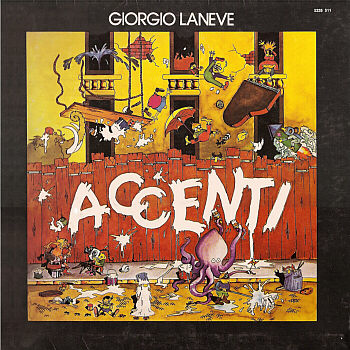
[1976]
Testo: Giorgio Laneve e Luciano Beretta
Musica: Giorgio Laneve e Giovanni Bobbio
Arrangiamenti e direzione: Giovanni Bobbio
Interpreti: Giorgio Laneve e coro Le Mele Verdi di Mitzi Amoroso
Anno di incisione: 1976
Pubblicazione: 33 giri e MC, Divergo, 1976
Accenti è il secondo LP delle Mele Verdi, inciso con Giorgio Laneve; pubblicato su 33 giri dalla Divergo, e su musicasseta (attualmente introvabile). La registrazione è avvenuta al Central Studio e allo Studio Trevisani di Milano ed è terminata l’11 novembre 1976. All'interno della copertina del 33 giri sono pubblicati i testi delle canzoni. Nel 1977 è uscito anche un singolo (45 giri) contenente due canzoni tratte dall'LP: Accenti e La girandola. Musicisti: Giovanni Bobbio (chitarra, basso, flauto, tastiere), Reddy Bobbio (tastiere); Giulio del santo (tastiere); Mario Lamberti (effetti sonori); Giorgio Laneve (chitarra);... (continuer)
Testo: Giorgio Laneve e Luciano Beretta
Musica: Giorgio Laneve e Giovanni Bobbio
Arrangiamenti e direzione: Giovanni Bobbio
Interpreti: Giorgio Laneve e coro Le Mele Verdi di Mitzi Amoroso
Anno di incisione: 1976
Pubblicazione: 33 giri e MC, Divergo, 1976
Accenti è il secondo LP delle Mele Verdi, inciso con Giorgio Laneve; pubblicato su 33 giri dalla Divergo, e su musicasseta (attualmente introvabile). La registrazione è avvenuta al Central Studio e allo Studio Trevisani di Milano ed è terminata l’11 novembre 1976. All'interno della copertina del 33 giri sono pubblicati i testi delle canzoni. Nel 1977 è uscito anche un singolo (45 giri) contenente due canzoni tratte dall'LP: Accenti e La girandola. Musicisti: Giovanni Bobbio (chitarra, basso, flauto, tastiere), Reddy Bobbio (tastiere); Giulio del santo (tastiere); Mario Lamberti (effetti sonori); Giorgio Laneve (chitarra);... (continuer)
Come avviene sulla terra
(continuer)
(continuer)
envoyé par Riccardo Venturi 8/2/2016 - 06:48
Sólo le pido a Dios

Esiste su YouTube anche una struggente interpretazione di questa canzone (in lingua originale) da parte del cantautore bolognese Germano Bonaveri.
Andrea Pesce 7/2/2016 - 23:54
Petit Pasqua Noël

PICCOLO PASQUA NATALE
(continuer)
(continuer)
envoyé par Daniel(e) Bellucci . 07.02.2016. Nizza 7/2/2016 - 23:34
A Change Is Gonna Come
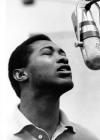
Fu rilasciata come bonus track del Greatest Hits del gruppo
A CHANGE IS GONNA COME
(continuer)
(continuer)
7/2/2016 - 21:54
Forgive Them Father
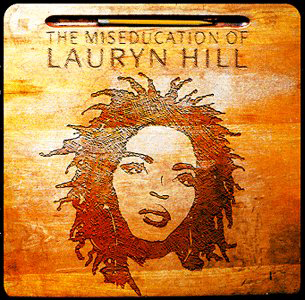
(1998)
feat. Shelly Thunder
dall'album "The Miseducation of Lauryn Hill", il primo e sinora unico album solista della cantante dei Fugees
ispirata a "Concrete Jungle" di Bob Marley
Una canzone zeppa di citazioni bibliche, sul perdonare i traditori pronti a calpestarti per raggiungere i loro sporchi fini, con riferimenti diretti alle battaglie per i diritti civili e contro l'Apartheid in Sudafrica.
feat. Shelly Thunder
dall'album "The Miseducation of Lauryn Hill", il primo e sinora unico album solista della cantante dei Fugees
ispirata a "Concrete Jungle" di Bob Marley
Una canzone zeppa di citazioni bibliche, sul perdonare i traditori pronti a calpestarti per raggiungere i loro sporchi fini, con riferimenti diretti alle battaglie per i diritti civili e contro l'Apartheid in Sudafrica.
Forgive us our trespasses as we forgive those that trespass against us
(continuer)
(continuer)
7/2/2016 - 19:58
Ho continuato la mia strada

C'ero anch'io alla Mandria e sono uno di quelli che ha suonato e cantato su quel palco, con il gruppo di Siracusa, per "sostituire" i contestati (non tanto loro quanto l'idea degli organizzatori di pagare qualcuno per esibirsi) Angelo Branduardi (quasi sconosciuto al tempo) e Napoli Centrale (appena costituito, Pino Daniele ha collaborato 2 anni dopo).
Non mi era più capitato di cantare questa canzone.
Ieri, a casa di vecchi amici non scout, raccontando dei tempi andati e della route, abbiamo trovato su youtube i remake di Paolo e di un gruppo del Molise https://www.youtube.com/watch?v=reyt1qdlSx4 .
Mi sono commosso e sono riaffiorati tutti i ricordi di quei giorni e di quella serata, nitidi, precisi, intensi.
E' .... bellissimo
Non mi era più capitato di cantare questa canzone.
Ieri, a casa di vecchi amici non scout, raccontando dei tempi andati e della route, abbiamo trovato su youtube i remake di Paolo e di un gruppo del Molise https://www.youtube.com/watch?v=reyt1qdlSx4 .
Mi sono commosso e sono riaffiorati tutti i ricordi di quei giorni e di quella serata, nitidi, precisi, intensi.
E' .... bellissimo
Giampiero Divotti 7/2/2016 - 10:00
Revolte sur les terres occupées
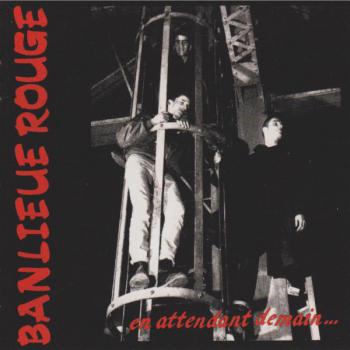
Album: En Attendant Demain (1990)
Folie meurtrière et guerre sanguinaire
(continuer)
(continuer)
6/2/2016 - 23:12
Parcours:
L'Holocauste palestinien
De dödsdömda
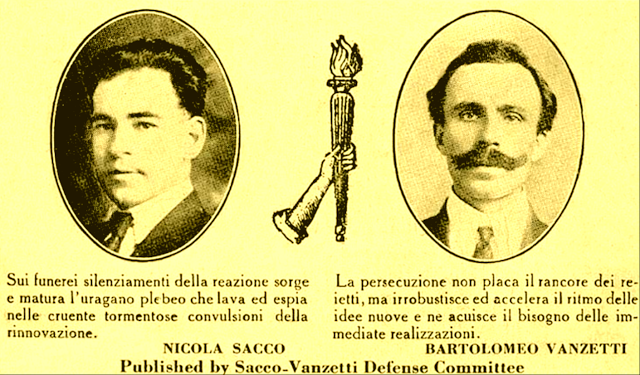
d’après la version italienne de Riccardo Venturi
d’une chanson suédoise - De dödsdömda – Jan Hammarlund – 2008
Un poème de Karin Boye (1927)
mis en musique et chanté par Jan Hammarlund
Karin Boye (1900-1941).
La Grande Karin Boye, autrice de Kallocain, roman distopique qui anticipa 1984 de George Orwell, écrivit cette poésie en 1927 pour Sacco et Vanzetti. Le texte nous a été envoyé directement par l’ami Jan Hammarlund, que l’a mis en musique et chanté. [RV]
Le 22 août 2014 s’est déroulé à l’Istituto De Martino de Sesto Fiorentino, un important événement pendant lequel a été projeté le très rare et survivant film des enterrements de Sacco et de Vanzetti (présenté par l’Université Libertario de Florence). En marge, il m’est revenu à l’esprit que, en février 2008, j’avais traduit en italien cette chanson de Jan Hammarlund tirée d’une poésie de Karin Boye. La traduction nous la fîmes en réalité... (continuer)
d’une chanson suédoise - De dödsdömda – Jan Hammarlund – 2008
Un poème de Karin Boye (1927)
mis en musique et chanté par Jan Hammarlund
Karin Boye (1900-1941).
La Grande Karin Boye, autrice de Kallocain, roman distopique qui anticipa 1984 de George Orwell, écrivit cette poésie en 1927 pour Sacco et Vanzetti. Le texte nous a été envoyé directement par l’ami Jan Hammarlund, que l’a mis en musique et chanté. [RV]
Le 22 août 2014 s’est déroulé à l’Istituto De Martino de Sesto Fiorentino, un important événement pendant lequel a été projeté le très rare et survivant film des enterrements de Sacco et de Vanzetti (présenté par l’Université Libertario de Florence). En marge, il m’est revenu à l’esprit que, en février 2008, j’avais traduit en italien cette chanson de Jan Hammarlund tirée d’une poésie de Karin Boye. La traduction nous la fîmes en réalité... (continuer)
LES CONDAMNÉS À MORT
(continuer)
(continuer)
envoyé par Marco Valdo M.I. 6/2/2016 - 17:38
Azadî bo Kurdistan
“l’Autonomia Democratica è diventata la pratica quotidiana di milioni di donne e di uomini…”
una segnalazione, ciao
Gianni
una segnalazione, ciao
Gianni
Gianni Sartori 6/2/2016 - 16:20
Il tessitore damerino

Tu provenivi da una terra assai lontana,
(continuer)
(continuer)
envoyé par dq82 6/2/2016 - 12:57
Où me suis-je perdu

Ou Me Suis-Je Perdu di Salvatore ADAMO. dal sito Adamo in "italiano" http://www.adamosalvatore-dc.com/
5/2/2016 - 23:38
×
![]()

